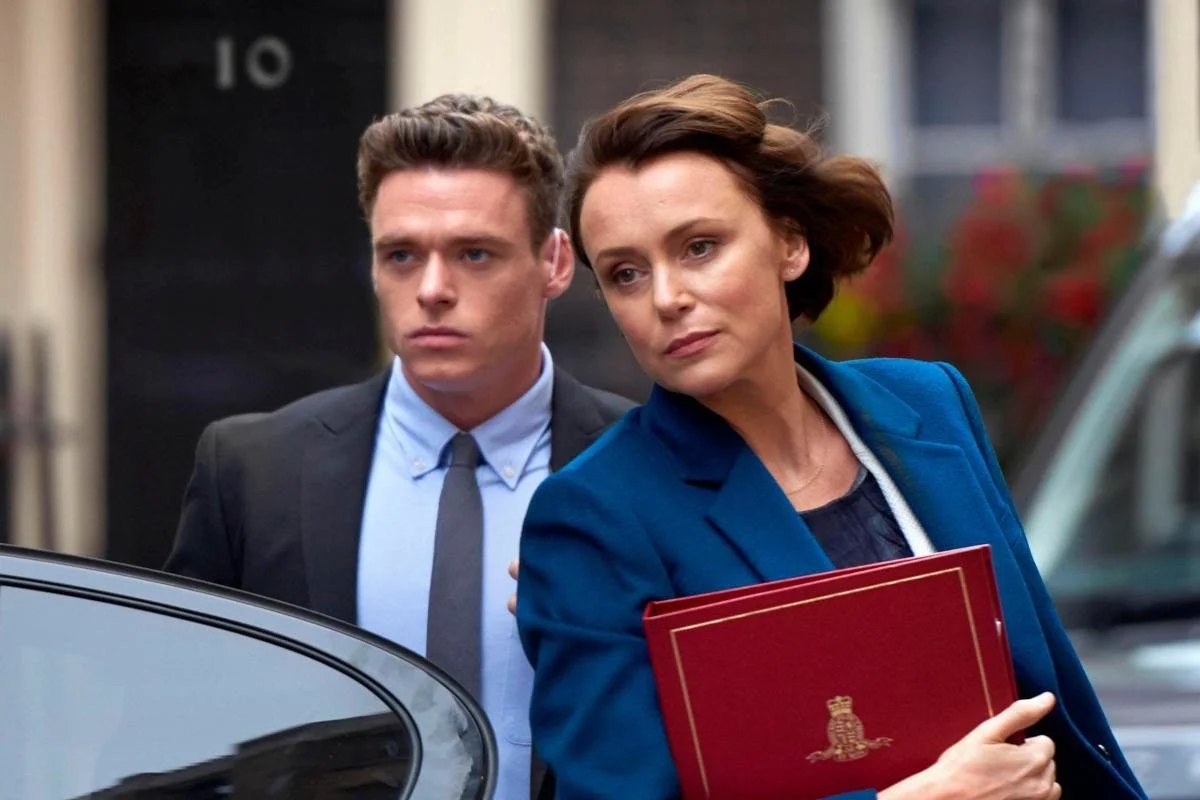Bodyguard Proves the Downside of Narrative Risk
Bodyguard, the BBC limited TV series also showing on Netflix, blends political and sexual intrigue. Richard Madden (Robb Stark on Game of Thrones) plays David Budd, an Afghanistan veteran suffering in secret from PTSD. Now working in government security, Budd is assigned to protect Julia Montague (Keeley Hawes), the politically ambitious Home Secretary, who is campaigning for greater reach and powers for the security service in the name of combating terrorism. While the disillusioned Budd is sceptical of Montague’s politics, he is drawn to her charms and dominating personality, and a love affair ensues. Entwining personal and political power dynamics against the background of the War on Terror, Bodyguard in many respects plays like the British version of Homeland. But it is the relationship between Budd and Montague that lends the show special interest.
Although Richard Madden sets aside chain mail and a long sword for a black suit and earpiece, there is still something knightly about his bodyguard, David Budd. For instance, in the first episode Budd displays uncommon compassion, fortitude, and heroism as he stops a female suicide bomber on a train. As the season develops, Budd’s relationship with Montague takes on elements of courtly romance, with the woman holding status and power over the warrior assigned to protect her, and their illicit sexual relationship taking place amidst matters of state.
The exact nature of Montague and Budd’s relationship is difficult to read, as it is marked by clear mutual attraction combined with ambiguous intentions on both sides. For instance, in spite of their sexual chemistry, is Montague ensnaring Budd for political ends? Does Budd harbour sinister purposes against the lady whose politics he despises? The ambiguity of their relationship contributes to the show’s mounting tension.
Another major contribution to the show’s impact is its topicality. If anything, the relevance of Bodyguard is perhaps too on the nose. It’s as if the creator, Jed Mercurio, were checking off references to the contemporary moment. Bodyguard portrays a disillusioned veteran with PTSD, a divided Tory party full of ruthless climbers, and a bill accruing power to security and intelligence services. It addresses themes such as the stigma of male mental health issues, the political drivers of war and terror, and the conflict between civil liberties and national security. More intriguingly, the show seems to demonstrate a second phase of War on Terror narratives, in which fears about the surveillance state are given at least equal, if not more concern, than actual political terror.
In spite of the appealing setting, fascinating narrative machinations, and sophisticated character dynamics, Bodyguard does contain some weaknesses and one outright flaw.
Although the production is high-quality, the formal elements, such as the cinematography and editing, are only average in execution. As I’ve noticed with other recent BBC shows such as Sherlock, Bodyguard displays an excess of formal gimmicks and flair (such as slowing things down, phasing out sound) while generating a lack of effective suspense. This is because, as Hitchcock illustrated, suspense is generated not through fancy and abundant shots and cuts but through the careful creation and manipulation of maximal audience awareness of a situation. Viewers cannot anticipate what is unclear or unknown to them. An attack on a school in the second episode is an excellent demonstration of audience confusion limiting suspense.
Narrative tension is further deflated with a bold twist in the storyline. If you want to avoid spoilers, read no further.
The critical tendency to reward risk in art can obscure one very plausible outcome of any artistic choice, that is, failure. The decision to kill off Montague halfway through the show is bold yet disastrous. While the surprising death of major characters is no longer unknown to the world of television after Game of Thrones, the death of Montague significantly diminishes Bodyguard since it eliminates the show’s most lively character dynamics as well as the tantalizing narrative questions the character generated. We are left only to contemplate Budd’s ultimate aims, and to see whether he escapes wrongful arrest. The quality of the show drops from “very good” to “passable.”
For the remainder of the show, the narrative collapses inward and away from a grand political narrative, eventually roping in the mob, among other villains, and retreating to a narrow and conventional conclusion. It’s a pity, since the show started with loads of potential, but the failure of Bodyguard to protect its central duo leads to its own demise.
Bodyguard (2018, BBC One)
Created by Jed Mercurio; starring Richard Madden, Keeley Hawes, Gina McKee, Sophie Rundle, Ash Tandon, Nina Toussaint-White, and Pippa Haywood.
